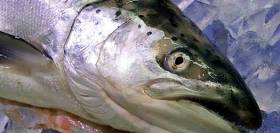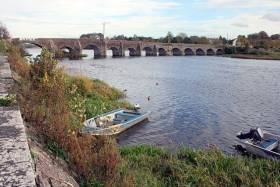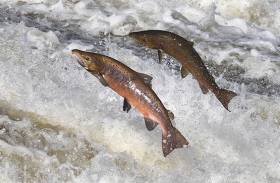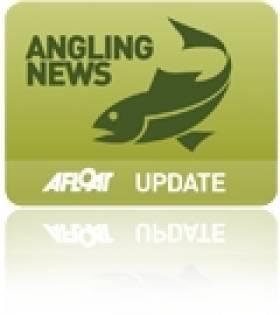Displaying items by tag: Salmon
Clare Man Found Guilty of Illegal Netting on the Shannon Estuary
At a sitting of Kilrush District Court on 11th April 2016, Judge Patrick Durkan convicted a man of illegal netting for salmon on the Shannon Estuary. Mr John Beehan with an address at Burrane, Kilimer, Co Clare, was fined €500 in addition to costs amounting to €500.
Judge Durkan heard evidence that while carrying out surveillance on an area near Kilimer, Co Clare in June 2015, fishery officers observed Mr Beehan to be in control of a fishing net which had two salmon caught in it. The officers gave evidence and were cross-examined. Mr Beehan’s defence was that he had been curious to see what was going on in the area as he had seen an unfamiliar car and he denied that the fishing net was his.
In summarising his judgement on the case, Judge Durkan said that he was satisfied that there was a case to answer. He added that the motor car was very important in the defence of “taking a look” and the reason for this could only be that the car had a boot.
Ms Amanda Mooney, Director at Inland Fisheries Ireland, Limerick, commented: “Netting for salmon in the Shannon Estuary is prohibited. Such illegal fishing is an environmental crime and is a contributing factor to the decline of Ireland’s vulnerable salmon stocks.”
Inland Fisheries Ireland (IFI) has a confidential hotline number to enable members of the general public to report incidents - 1890 34 74 24 or 1890 FISH 24. This phone line is designed to encourage the reporting of incidents of illegal fishing, water pollution and invasive species.
Limerick Man Convicted Of Illegal Fishing On River Shannon
#Angling - At a sitting of Killaloe District Court on Tuesday 5 April, Judge Patrick Durkan convicted a man of illegal fishing on the River Shannon at O’Brien’s Bridge in August 2015.
Joe Ahern of O’Brien’s Bridge, Co Limerick was found guilty of illegally fishing with prawns and was fined €750 and costs amounting to €1025. Ahern pleaded guilty to the offence and co-operated fully with the fishery officers.
Salmon angling on the River Shannon is currently permitted below O’Brien’s Bridge to Thomond Bridge in Limerick City under a local catch and release byelaw. Wild salmon must be returned immediately if caught and the use of prawns is prohibited under byelaw in the entire Shannon catchment.
These measures are present to protect returning wild salmon stocks, especially to large river catchments such as the River Shannon. The wild salmon populations in the Shannon River have declined in recent years.
In summarising his judgement on the case, Judge Patrick Durkan commented that fisheries were the greatest resource of this country and that fishery officers must be allowed to protect them.
Amanda Mooney, sirector at Inland Fisheries Ireland (IFI) in Limerick, said: “Anglers must adhere to conservation methods in place on our rivers as these measures are introduced to protect vulnerable stocks and provide an opportunity for rivers to recover.
"We need to work together to improve our stocks so that the wonderful resource can be passed onto the next generation. Inland Fisheries Ireland is committed to the protection of our wild salmon stocks.”
IFI has a confidential hotline number to enable members of the general public to report incidents - 1890 34 74 24 or 1890 FISH 24. This phone line is designed to encourage the reporting of incidents of illegal fishing, water pollution and invasive species.
New Statistics On Northern Ireland's Inland Fisheries
#Angling - Northern Ireland's Department of Culture, Arts and Leisure (DCAL) has published a digest of statistics for salmon and inland fisheries in the department's jurisdiction.
The main purpose of these statistics is to give an overview of the DCAL fisheries sector in Northern Ireland. The latest available data have been drawn together from a number of published and unpublished sources.
Some key statistics from the report include the following:
- There were 25,667 angling licences and 17,984 DCAL permits sold in 2014.
- 1,024 rod licences and 1,013 permits were checked in the DCAL public angling estate in 2014/15.
- There were approximately 361,000 salmon fry stocked from Bushmills Hatchery to rivers in Northern Ireland in 2014.
- No salmon were caught in commercial fishing nets in 2014.
- The estimated return of wild adult salmon to the River Bush in 2014 was 963 and was below the previous 10-year average (2004-2013) of 1,239.
- The 10-year overall eel catch average in Lough Neagh (2005-2014) of 399 tonnes is 35% less than the previous ten year eel catch average (1995-2004) of 612 tonnes.
- The eel escapement estimate for the Neagh-Bann River Basin District for 2014 was 253 tonnes and above the 200 tonnes target.
The bulletin is available on the DCAL website or from the Research and Statistics Branch, Department of Culture, Arts and Leisure, Causeway Exchange, 1-7 Bedford Street, Belfast BT2 7EG (Tel: 028 9081 6971; Email: [email protected]).
In other news, Northern Ireland's Culture, Arts and Leisure Minister Carál Ní Chuilín has welcomed a new platform designed to accommodate disabled anglers at Copeland Reservoir in Carrickfergus.
The concrete platform is built to a high specification and gives anglers who use wheelchairs close and safe access to the water.
“Angling is an integral part of our leisure offering not only for local people, but also for tourists," said the minister this week. "It is a very relaxing and peaceful way of passing time and unwinding in the open air, and I am committed to ensuring that wheelchair users have equal access to angling."
Minister Ní Chuilín said the new platform "is designed to ensure that wheelchair-using anglers can get as close as possible to the water’s edge, safely. There is also a car park located right beside it, further enhancing accessibility.
“There is a considerable disabled angling fraternity locally, with over 1,700 one-year disabled angling licences and 1,500 day permits being issued each year. This is a significant number, and I want to see even more disabled people experiencing the benefits of angling for themselves."
The new stand "offers disabled anglers another choice of location to fish, and visit the surrounding area. It brings to more than 30 the number of public angling estate locations which are accessible to anglers with a disability," the minister added.
“I commend staff in my department’s Inland Fisheries Group who have constructed the platform and I hope that it caters for disabled anglers for many years to come.”
Applications Open For 2016 Commercial Salmon Licences
#Fishing - In accordance with the Control of Fishing for Salmon Order 2016, Inland Fisheries Ireland invites applications for commercial salmon fishing licences (draft net and snap net).
Application forms may be obtained from your local Inland Fisheries Ireland Office as listed here:
IFI Dublin 01 884 2600
IFI Clonmel 052 618 0055
IFI Macroom 026 41221
IFI Limerick 061 300 238
IFI Galway 091 563 118
IFI Ballina 096 22788
IFI Ballyshannon 071 985 1435
The statutory closing date for receipt of completed applications to the relevant IFI office is 5pm on Thursday 24 March. Applications received after this date cannot be accepted.
2016's First Salmon Honours Go To Lough Currane
#Angling - Ireland's first salmon of the year was caught last week in Co Kerry, as The Irish Times reports.
And it was a first for Lough Currane as angling guide Neil O'Shea landed 2016's maiden salmon catch nationally, a 10-pounder taken near 'The Bridge'.
However, it marks the third time O'Shea has been the first of the year to catch a salmon on the lough, previously claiming that title in 2009 and 1986.
The Irish Times has more on the story HERE.
Diesel Laundering Has Polluted Key Salmon River Say Anglers
#Pollution - The effects of diesel laundering over decades in South Armagh are being felt even greater today, say Dundalk anglers, as the New Year starts with the River Fane closed to all but catch-and-release fishing.
As Independent.ie reports, a 10-fold decrease in stocks of salmon as well as brown trout and sea trout in the river, which flows into Dundalk Bay from the Monaghan-Armagh border, is the direct result of diesel laundering operations by the IRA since at least the 1980s.
Waste from the process of converting subsidised agricultural 'green' diesel to 'white' diesel for general road use has reportedly been dumped openly into a tributary of Lough Ross, which feeds into the Fane – a river that supplies drinking water to Dundalk and much of North Louth.
A recent study found that these pollutants include polycyclic aromatic hydrocarbons or PAHs, the same chemicals that continue to affect spawning grounds in areas impacted by the Exxon Valdez oil spill in Alaska 26 years ago.
Independent.ie has much more on the story HERE.
82 Rivers Open For Salmon Angling In 2016
#Angling - Minister of State Joe McHugh has approved a suite of regulations and bye-laws that will govern the wild salmon and sea trout fisheries in the New Year, coming into effect from Friday 1 January.
Minister McHugh said 50 rivers will be fully open and this will provide opportunities for all to share this important natural resource on a sustainable basis. A further 32 will be open for angling on a catch and release basis.
In all, 82 rivers will open for angling activity in 2016 - one fewer than in 2015.
Minister McHugh received management advice in relation to 146 genetically individual wild salmon stocks in Ireland from Inland Fisheries Ireland (IFI) before making a final decision.
This advice was also made available publicly as part of a public consultation process and was based on the scientific assessment of the current status of all stocks carried out by the independent Standing Scientific Committee on Salmon.
The committee comprises scientists from IFI, Bord Iascaigh Mhara (BIM), the Marine Institute, the Loughs Agency, the National Parks and Wildlife Service (NPWS), the Agri-Food and Biosciences Institute (AFBI- Northern Ireland) other State bodies and third level institutions.
Thirteen submissions were considered as part of the public consultation process which closed on 10 December.
In all, the Independent Standing Scientific Committee for Salmon (SSCE) assessed 146 rivers/estuaries/harbours and has advised that:
- 50 rivers are open as a surplus of fish has been identified in these rivers.
- 32 rivers are classified as open for “catch and release” angling.
- 64 rivers are closed as they have no surplus of fish available for harvest.
The Wild Salmon and Sea Trout Tagging Scheme Regulations for 2016 are in essence unchanged from the Regulations which were introduced for 2015.
Track Machine Owner Fined for Damage to Salmon River
At a sitting of Drogheda District Court on 15th September 2015, Judge William Hamill convicted a track machine owner, Mr Ronan Sheridan of Beshellstown, Garrison, Co Meath, under Section 131 of the 1959 Fisheries Act, for causing extensive damage to the bed of a tributary of the Nanny River in Co Meath. Mr Sheridan was fined €500 and ordered to pay full costs of €1,555.56 to Inland Fisheries Ireland.
In November 2014, Fishery Officer Dr Maureen Byrne observed that Mr Sheridan’s track machine had been used to divert river flows away from the natural course of the channel and permanently re-align 80 metres of the Annesbrook River, which is a tributary of the Nanny River.
The Nanny River supports wild Atlantic salmon and sea trout populations – species which have been the subject of a series of recently introduced conservation and protection measures from Inland Fisheries Ireland.
Dr Maureen Byrne gave evidence outlining details of significant damage that had been caused to the bed of the river, which is a spawning and nursery habitat for Atlantic salmon and sea / brown trout. Mr Sheridan was represented in court and pleaded guilty to the offence.
Commenting on the case, Mr Brian Beckett, Director, Inland Fisheries Ireland, Dublin, said there is a general prohibition under the Fisheries Acts from interfering with and damaging river and stream habitat. He said that Inland Fisheries Ireland continue to seek the assistance and cooperation of landowners as the primary custodians of the natural environment, not to engage in works likely to impact on the fisheries and aquatic environment without prior consultation with them. He acknowledged the many landowners who had and continue to make contact with Inland Fisheries Ireland to ensure that proposed works are undertaken in an environmentally sustainable manner.
Dr Ciaran Byrne, CEO of Inland Fisheries Ireland stated, “Destruction of fish habitat is an environmental crime and must be prevented. Such destruction impacts the potential of rivers to contribute to our social and economic wealth. Recreational salmon and sea trout angling is estimated to contribute €210 million to the Irish economy and supports over 3000 jobs. It is imperative that our fish habitat is conserved and protected to ensure the sustainability of this important natural resource.”
Inland Fisheries Ireland (IFI) has a confidential hotline number to enable members of the general public to report incidents - 1890 34 74 24 or 1890 FISH 24. This phone line is designed to encourage the reporting of incidents of illegal fishing, water pollution and invasive species.
Salmon Farms Can Have Significant Impact on Wild Salmon & Sea Trout Stocks
A definitive scientific paper, reviewing over 300 scientific publications, has just been published in the prestigious journal Aquaculture Environment Interactions on the effects of sea lice on sea trout stocks. A team of top international scientists from Norway, Scotland and Ireland reviewed all available published studies on the effects of sea lice and have concluded that sea lice have negatively impacted wild sea trout stocks in salmon farming areas in Ireland, Scotland and Norway.
The paper entitled “Effects of salmon lice Lepeophtheirus salmonis on wild sea trout Salmo trutta—a literature review” (https://research-repository.st-andrews.ac.uk/handle/10023/7295) reached its conclusions based on comprehensive studies of the effects of salmon lice from over 300 scientific publications. The project was funded by the Norwegian Seafood Research Fund which provides investment in Norwegian seafood industry-based R&D with the objective of creating added value for the seafood industry.
The study also examined the potential effect of sea lice on salmon and concluded that sea lice have a potential significant and detrimental effect on marine survival of Atlantic salmon with potentially 12-29% fewer salmon spawning in salmon farming areas. These conclusions concur with previously published Inland Fisheries Ireland (IFI) research on the potential impact of sea lice from marine salmon farms on salmon survival.
The studies reviewed indicate that salmon farming increases the abundance of lice in marine habitats and that sea lice in intensively farmed areas have negatively impacted wild sea trout populations. The effects of sea lice on sea trout are increased marine mortality and reduced marine growth. This new study confirms the evidence collected since the early 1990’s in Ireland regarding the impact of sea lice on wild sea trout stocks, particularly in relation to the collapse of Connemara’s sea trout stocks.
IFI have consistently called for marine salmon farms to maintain sea lice levels close to zero prior to and during the wild sea trout and salmon smolt migration period in spring. IFI have also raised concerns regarding the location of salmon farms in the estuaries of salmon and sea trout rivers.
The Board of Inland Fisheries Ireland welcomed this important publication and commented: “This new scientific review paper confirms the need for very tight regulation of sea lice levels on salmon farms and raises legitimate concerns with regard to the potential impact of new large scale salmon farms proposed along Irelands west coast on salmon and sea trout stocks. Regulators will now need to consider the results of this comprehensive review when making decisions on the sustainability and approval of future marine salmon aquaculture licences and the regulation of sea lice at existing sites so as to ensure no negative impact on salmon and sea trout stocks.”
Minister Launches €240K Funding For Fisheries Development
#Angling - The 2015 Salmon Conservation Fund (SCF) and Midland Fisheries Fund (MFF) are now open for applications, Minister Joe McHugh has announced yesterday (Wednesday 15 April).
In total, €240,000 is available to conserve and develop the inland fisheries resource from funds generated through the sale of salmon licences and Midland Fisheries Area permits.
The schemes administered by Inland Fisheries Ireland (IF) will facilitate clubs, fishery owners, commercial salmon fishers and other organisations to undertake works to improve habitat, stocks, access, invasive species management and angling, under the supervision and direction of IFI.
The works undertaken are important in maintaining and improving capacity within the inland fisheries resource, which is estimated to contribute €755 million annually to the Irish economy.
Announcing the schemes, Minister McHugh said: “I am pleased to be able to support IFI in making these funds available to fisheries interests to allow for ground-up, managed sustainable development of the inland fisheries resources.
"Some wonderful projects have been supported since these funds have been established and I encourage all those interested in fisheries to investigate the possibilities under the various schemes to conserve, develop and promote their local fisheries.”
The Salmon Conservation Scheme has been in existence for eight years and has allocated funding to 184 salmon projects all around Ireland. €200,000 is available for distribution under this scheme in 2015.
The Midland Fisheries Fund, which is now beginning its third year, has seen 17 projects undertaken in the midlands area developing angling resources, supporting scientific research and conserving fisheries habitat. A further €40,000 is available under this scheme for 2015.
Full details and application forms are available on the Midland Fisheries Fund HERE.



























































